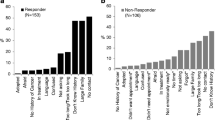Abstract
Increasing demands upon specialist cancer genetics services have resulted in a need to explore alternative means of delivering genetic risk information to individuals at low-risk of familial cancer. This pilot study investigates patient satisfaction with a letter to low and moderate risk individuals notifying them of their risk. Sixty-six people completed a questionnaire designed to measure satisfaction with the way they had been notified of their cancer risk. Two key findings emerge from the data: first of all, whilst many respondents indicated overall satisfaction with the risk letter, a substantial number wanted more information about their risk; and secondly, low-risk individuals in this study are less reassured by and less satisfied with the risk letter than those at moderate risk. The optimal service provision for delivery of genetic risk information is likely to be one which can best respond to individual differences in information-seeking, distress and risk comprehension. There is a need therefore, for a randomised control trial to compare the effectiveness of a risk notification letter with more traditional telephone risk counselling and the implications of each mode of delivery upon the resources of specialist cancer genetics services.
Similar content being viewed by others
References
Gotay CC, Bottomley A. Providing psycho-social support by telephone: what is its potential in cancer patients? Eur J Cancer Care 1998; 7: 225–31.
Sangha KK, Dircks A, Langlois S. Assessment of the effectiveness of genetic counselling by telephone compared to a clinic visit. J Genet Couns 2003; 12(2): 171–83.
Bernhardt BA, Biesecker BB, Mastromarino CL. Goals, benefits, and outcomes of genetic counselling: client and genetic counsellor assessment. Am J Med Genet 2000; 94: 189–97.
Bowen DJ, Ludwig A, Bush N et al. Early experience with a webbased intervention to inform risk of breast cancer. J Health Psychol 2003; 8(1): 175–86.
Green MJ, McInerney AM, Biesecker BB et al. Education about genetic testing for breast cancer susceptibility: patient preferences for a computer program or genetic counsellor. Am J Med Genet 2001; 103: 24–31.
Ong G, Austoker J, Brouwer A. Evaluation of the written information sent to women who are called back for further investigation of breast screening in the UK. Health Educ J 1996; 55: 413–29.
Davey C, Austoker J, Jansen C. Improving written information for women about cervical screening: evidence-based criteria for the content of letters and leaflets. Health Educ J 1998; 57: 263–81.
Weinman J. Providing written information for patients: psychological considerations. J R Soc Med 1990; 83: 303–5.
Shiloh S, Avdor O, Goodman RM. Satisfaction with genetic counseling: dimensions measurement. Am J Med Genet 1990; 37: 522–9.
Watson M, Lloyd S, Davidson J et al. The impact of genetic counselling on risk perception and mental health on women with a family history of breast cancer. Br J Cancer 1999; 79(5/6): 868–74.
Department of Health White Paper. Our inheritance, our future – realising the potential of genetics in the NHS, 2003.
Emery J, Watson E, Rose, P et al. A systematic review of the literature exploring the role of primary care in genetic services. Fam Pract 1999; 16(4): 426–45.
Watson E, Austoker J, Lucassen A. A study of GP referrals to a family cancer clinic for breast/ovarian cancer. Fam Pract 2001; 18(2): 131–4.
Nordin K, Liden A, Hansson M et al. Coping style, psychological distress, risk perception, and satisfaction in subjects attending genetic counselling for hereditary cancer. J Med Genet 2002; 39: 689–94.
Duric V, Butow P, Sharpe L et al. Reducing psychological distress in a genetic counselling consultation for breast cancer. J Genet Couns 2003; 12(3): 243–64.
Brain K, Gray J, Norman P et al. Randomized trial of a specialist genetic assessment service for familial breast cancer. J Natl Cancer Inst 2000; 92: 1345–51.
Watson M, Duivier V, Wade Walsh M et al. Family history of breast cancer: what do women understand and recall about their genetic risk? J Med Genet 1998; 35: 731–8.
Hopwood P, Keeling F, Long A et al. Psychological support needs for women at high genetic risk of breast cancer: some preliminary findings. Psychooncology 1998; 7: 402–12.
Iredale R, Brain K, Edwards L et al. The information and support needs of women at high risk of familial breast and ovarian cancer: how can cancer genetic services give patients what they want? Fam Cancer 2003; 2: 119–21.
Author information
Authors and Affiliations
Rights and permissions
About this article
Cite this article
Phelps, C., Platt, K., France, L. et al. Delivering Information about Cancer Genetics via Letter to Patients at Low and Moderate Risk of Familial Cancer: A Pilot Study in Wales. Familial Cancer 3, 55–59 (2004). https://doi.org/10.1023/B:FAME.0000026838.92085.ec
Issue Date:
DOI: https://doi.org/10.1023/B:FAME.0000026838.92085.ec




